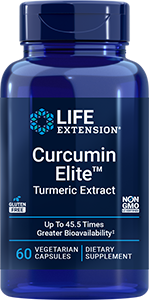
How to Find High Quality Curcumin
Published: June 2021 | Updated: July 2025
Whether you're green or well-seasoned in the wellness space, chances are you're familiar with the many benefits that turmeric, aka the golden spice, brings to the table. And if you're really paying attention, you've probably noticed curcumin supplements have become extremely popular these days.
As an active compound of turmeric root, curcumin has stellar antioxidant properties. It also helps inhibit inflammatory factors to support your brain, joints, immune health, digestive system and pancreas. This means a curcumin supplement will offer powerful benefits to your health that surpass what you might get from enjoying turmeric as a spice in food.
Unfortunately, though, not all curcumin supplements are equally beneficial. So how do you tell a top-of-the-line curcumin supplement from the bargain basement?
We've got a handy shopping guide to help you locate the crème de la crème of curcumin!
1. Choose a bioavailable curcumin supplement
Just because the bottle says "curcumin supplement" doesn't mean you're automatically getting the good stuff. That's because, on its own, curcumin isn't easy for your body to use. The culprit is called conjugation: it tends to bind to other compounds during the digestion process, making it harder for your bloodstream to absorb free, unbound curcumin and distribute it throughout your body.
Fortunately, over the years, there have been several ways researchers have improved curcumin's absorption. One common practice has been adding piperine, an active compound in black pepper extracts, to increase bioavailability. Adding black pepper to your turmeric recipes is a good way to get more benefits from your food—but there are better ways to ensure you're getting enough curcumin.
More recently, scientists identified an even better way to improve curcumin absorption: using fibers from fenugreek. Researchers have discovered that when you combine curcumin with fenugreek fibers, it keeps curcuminoids from conjugating—by a lot: there's up to 45 times more bioavailability of "free" (that's unconjugated) curcuminoids in a curcumin-fenugreek combo formula than in a traditional curcumin supplement.
So buying a curcumin supplement that only contains curcumin likely won't yield the same benefits of curcumin combined with fenugreek fibers or another more specialized delivery system.
2. Stick with standardized doses of curcuminoids
In addition to looking for compounds like fenugreek fibers, which make curcumin easier to absorb, you also want to look for formulas that deliver a standardized dose of curcuminoids, the active compounds in turmeric root. This is because not every single part of turmeric is equally beneficial to your body. (If that were true, just sipping on a turmeric latte would be enough!)
3. Don't focus on the amount of turmeric in the supplement
Remember, curcumin is the beneficial compound in turmeric, so don't choose based on the weight or volume of turmeric; the number you care about is the amount of curcumin delivered per dose. If a curcumin supplement's claim to fame is just how much turmeric it contains, be skeptical!
4. Choose a science-backed curcumin supplement
There may be many curcumin supplements out there, and that can feel overwhelming, but you can immediately eliminate any that don't have recent scientific studies backing up the efficacy of their products. You want scientifically studied formulas that deliver the exact dosage of the studied ingredients so that you have complete confidence that you're getting the nutritional benefits your body deserves.
How do you know whether a product is science-backed? A supplement manufacturer with a good reputation will make a Certificate of Analysis available upon request. This COA is a scientific breakdown of exactly what's in the formula.
5. Expensive doesn't mean "the best"
The best curcumin supplement isn't necessarily the most expensive in the marketplace, so don't assume that just because a supplement is pricy, that means it's the one for you. Go for an option that meets all the criteria above, and doesn't break the bank.
6. Brand reputation matters
Always on the lookout for designer "dupes"? Thrifting is fun when it comes to shoes and clothes, but is best avoided when shopping for dietary supplements. Instead, stick with a quality brand that's been in business for years, tests their products for safety and accuracy, is staffed with helpful (and health-minded) customer service representatives, and offers a satisfaction guarantee. Your downward-facing dog pose might be the same regardless of the label that's on your yoga pants, but the same cannot be said about your health when you aren't selective about your supplements!
7. Ask your healthcare provider's opinion
Wondering which version of the "golden spice" to take? Your physician's opinion is worth its weight in gold! Be sure to seek it out at your next appointment.
8. Read customer reviews (A lot of them)
One caveat, though: Everyone's body chemistry is going to be somewhat different, so a curcumin supplement that "works wonders" for your neighbor may not do the same for you, and vice versa. That being said, look for overall trends in customer reviews, as well as volume.
Once you've found a supplement that meets this (admittedly picky) criteria, then be sure to take it every day!
Explore Our Best Curcumin/Turmeric Supplements
Turmeric and Curcumin: What's the Difference?
You may see both turmeric and curcumin supplements on the market, so how are they different?
Turmeric is a plant. And a root. And a spice that's made from the powdered root of the plant of the same name. Turmeric, the plant "(Curcuma longa)" as well as the root—and because of that, the spice—are all originally from India. So are the ancient Ayurvedic traditions that made turmeric famous for supporting joint and digestive health.
Curcumin is a curcuminoid compound contained within the ancient turmeric spice. Modern science indicates that curcumin is good for "brain" and immune health, and it's "most" famous for its ability to help inhibit inflammatory factors to promote joint health and comfort.
So if curcumin is within turmeric, why not just rely on your diet to get its benefits? While it's true that this compound is found in turmeric spice, it's at much lower quantities than you'd get in a curcumin supplement. That's why curcumin in capsule form is concentrated (or at least it should be). Otherwise, you might as well pop the capsule open and use it to flavor your noodles!
Is all curcumin non-GMO?
No. But if non-genetically modified ingredients are important to you, most reputable supplement manufacturers print that info right on the label. A product can be non-GMO third party certified or self-certified.
Pro tip: Want to support a healthy inflammatory response, but curcumin is not your jam? Take a quick quiz and get personalized suggestions on high-quality supplements that help inhibit inflammation to support whole-body health.
So what's the best curcumin out there?
While you've got many options, a fenugreek-curcumin combo that includes complementary extracts (ginger and turmerone) is the gold standard. This combination results in a powerful 45.5 times better bioavailability of free (that's unconjugated) curcuminoids…and a whopping 270 times more total curcuminoids…than a standard curcumin turmeric supplement.
So now you know: for the best results, keep your spice rack and your supplement cabinet separate; choose turmeric for your food, and high-quality curcumin for your heart, mind, joints and health!
References
- Chainani-Wu N. "Safety and anti-inflammatory activity of curcumin: a component of tumeric (Curcuma longa)." J Altern Complement Med. February 2003. https://pubmed.ncbi.nlm.nih.gov/12676044/
- Ciuca MD, Racovita RC. "Curcumin: Overview of Extraction Methods, Health Benefits, and Encapsulation and Delivery Using Microemulsions and Nanoemulsions." Int J Mol Sci. May 2023. https://pmc.ncbi.nlm.nih.gov/articles/PMC10219365/
- Dei Cas M, Ghidoni R. "Dietary Curcumin: Correlation between Bioavailability and Health Potential." Nutrients. September 2019. https://pmc.ncbi.nlm.nih.gov/articles/PMC6770259/
- Hao M, et al. "Pharmacological effects, formulations, and clinical research progress of curcumin." Front Pharmacol. March 2025. https://pmc.ncbi.nlm.nih.gov/articles/PMC11955698/
- Jakubczyk K, et al. "Antioxidant Potential of Curcumin-A Meta-Analysis of Randomized Clinical Trials." Antioxidants (Basel). November 2020. https://pmc.ncbi.nlm.nih.gov/articles/PMC7694612/
- Kulkarni SK, Dhir A. "An overview of curcumin in neurological disorders." Indian J Pharm Sci. March 2010. https://pubmed.ncbi.nlm.nih.gov/20838516/
- Lagoa R, et al. "Application of curcuminoids in inflammatory, neurodegenerative and aging conditions - Pharmacological potential and bioengineering approaches to improve efficiency." Biotechnology Advances. September 2025. https://www.sciencedirect.com/science/article/pii/S0734975025000540?via%3Dihub
- Matthewman C, et al. "Review: bioavailability and efficacy of 'free' curcuminoids from curcumagalactomannoside (CGM) curcumin formulation." Nutr Res Rev. June 2024. https://pubmed.ncbi.nlm.nih.gov/36655498/
- Prasad S, Aggarwal BB. "Turmeric, the Golden Spice." Herbal Medicine: Biomolecular and Clinical Aspects, 2nd ed. https://www.ncbi.nlm.nih.gov/books/NBK92752/
Always be in the know!
Access the latest deals, wellness news, expert health tips & more!










